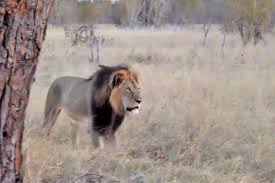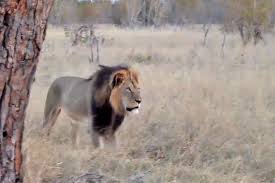
Five months after an American dentist caused an international furore by killing Cecil, a famed lion which lived in Zimbabwe, the US plans to extend its endangered species protection to lions in Africa.
Lions in southern and eastern Africa would be classified as threatened by the US Fish and Wildlife Service (FWS), along with those in the central and western regions and would be covered by full endangered status.
The import of lion “trophies”, such as paws or heads, would be prohibited by the move.
The move is significant because around half of all lion hunting in Africa is conducted by Americans and since the US cannot regulate hunting in other countries.
Over the past decade, more than 5,600 lions have been killed and imported by American hunters, reveals FWS data.
An outrage ensued after Cecil, a well-known lion with a distinctive dark mane was shot dead by Walter Palmer, a dentist from Minnesota. Cecil was shot with a bow and arrow after it was lured outside the boundaries of Zimbabwe’s Hwange national park where Palmer. Thousands of dollars had been paid by the doctor to kill a lion.
If he knew the lion had a name, Palmer said, he would not have shot Cecil. The vociferous protests led to his dental practice being temporarily closed. This outpour of outrage had prompted regulators to look at new ways to curb trophy hunting.
If the lion is from a country where lions are endangered, the new FWS law would completely ban bringing lion parts to the US from such countries. The countries that permit lion killing would have to show that they have “a scientifically sound management program that benefits the subspecies in the wild” and the hunters will have to show the trophies were “legally obtained” from such countries.
Hunters who claim that the money from lion hunting has been used to help communities in Africa and the overall conservation of lions would have a far greater onus to come up with proof of legal hunting according ot the new regulations.
Wildlife experts are f the view that there has been little conservation benefit from organised hunts as is evident from the persistent downward trend in lion numbers, due to habitat loss and hunting by locals and foreign tourists.
The African lion numbers have decreased by half since 1993, with a further 50% decline expected over the next 20 years for populations in west, central and east Africa, found an international study that was published in September.
“Many lion populations are either now gone or expected to disappear within the next few decades to the extent that the intensively managed populations in southern Africa may soon supersede the iconic savannah landscapes in east Africa as the most successful sites for lion conservation,” the study found and noted that lion populations are only increasing in southern Africa.
Lions are only listed as vulnerable, rather than endangered by the International Union for Conservation of Nature, despite this alarming slide in numbers. It is estimated by the organization that there are less than 20,000 Africans lions left. The other type of lions, the Asiatic lion, is numbered at around 520 and lives in the Indian state of Gujarat.
(Source:www.theguardian.com)
Lions in southern and eastern Africa would be classified as threatened by the US Fish and Wildlife Service (FWS), along with those in the central and western regions and would be covered by full endangered status.
The import of lion “trophies”, such as paws or heads, would be prohibited by the move.
The move is significant because around half of all lion hunting in Africa is conducted by Americans and since the US cannot regulate hunting in other countries.
Over the past decade, more than 5,600 lions have been killed and imported by American hunters, reveals FWS data.
An outrage ensued after Cecil, a well-known lion with a distinctive dark mane was shot dead by Walter Palmer, a dentist from Minnesota. Cecil was shot with a bow and arrow after it was lured outside the boundaries of Zimbabwe’s Hwange national park where Palmer. Thousands of dollars had been paid by the doctor to kill a lion.
If he knew the lion had a name, Palmer said, he would not have shot Cecil. The vociferous protests led to his dental practice being temporarily closed. This outpour of outrage had prompted regulators to look at new ways to curb trophy hunting.
If the lion is from a country where lions are endangered, the new FWS law would completely ban bringing lion parts to the US from such countries. The countries that permit lion killing would have to show that they have “a scientifically sound management program that benefits the subspecies in the wild” and the hunters will have to show the trophies were “legally obtained” from such countries.
Hunters who claim that the money from lion hunting has been used to help communities in Africa and the overall conservation of lions would have a far greater onus to come up with proof of legal hunting according ot the new regulations.
Wildlife experts are f the view that there has been little conservation benefit from organised hunts as is evident from the persistent downward trend in lion numbers, due to habitat loss and hunting by locals and foreign tourists.
The African lion numbers have decreased by half since 1993, with a further 50% decline expected over the next 20 years for populations in west, central and east Africa, found an international study that was published in September.
“Many lion populations are either now gone or expected to disappear within the next few decades to the extent that the intensively managed populations in southern Africa may soon supersede the iconic savannah landscapes in east Africa as the most successful sites for lion conservation,” the study found and noted that lion populations are only increasing in southern Africa.
Lions are only listed as vulnerable, rather than endangered by the International Union for Conservation of Nature, despite this alarming slide in numbers. It is estimated by the organization that there are less than 20,000 Africans lions left. The other type of lions, the Asiatic lion, is numbered at around 520 and lives in the Indian state of Gujarat.
(Source:www.theguardian.com)





